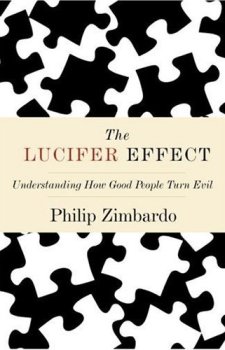
(Philip Zimbardo)
Fascinating interview with Philip Zimbardo best known for the infamous Stanford Prison Experiment in 1971. This classic and controversial study remains just as relevant today, particularly in light of the recent Abu Ghraib prisoner abuse scandal.
In addition to discussing the Stanford Prison Experiment, Zimbardo also talks about the nature of social psychology, the power of situations, obedience to authority and the mechanisms which can make good people engage in bad, immoral and illegal behavior.
Listen To The Interview:

Click Here to download the MP3 file and listen to the Philip Zimbardo interview in full.
Related Reading:
The Lucifer Effect: Understanding How Good People Turn Evil by Philip Zimbardo.

Book Description:
What makes good people do bad things? How can moral people be seduced to act immorally? Where is the line separating good from evil, and who is in danger of crossing it?
Renowned social psychologist Philip Zimbardo has the answers, and in The Lucifer Effect he explains how–and the myriad reasons why–we are all susceptible to the lure of “the dark side.” Drawing on examples from history as well as his own trailblazing research, Zimbardo details how situational forces and group dynamics can work in concert to make monsters out of decent men and women.
Zimbardo is perhaps best known as the creator of the Stanford Prison Experiment. Here, for the first time and in detail, he tells the full story of this landmark study, in which a group of college-student volunteers was randomly divided into “guards” and “inmates” and then placed in a mock prison environment. Within a week the study was abandoned, as ordinary college students were transformed into either brutal, sadistic guards or emotionally broken prisoners.
By illuminating the psychological causes behind such disturbing metamorphoses, Zimbardo enables us to better understand a variety of harrowing phenomena, from corporate malfeasance to organized genocide to how once upstanding American soldiers came to abuse and torture Iraqi detainees in Abu Ghraib. He replaces the long-held notion of the “bad apple” with that of the “bad barrel”–the idea that the social setting and the system contaminate the individual, rather than the other way around.
This is a book that dares to hold a mirror up to mankind, showing us that we might not be who we think we are. While forcing us to reexamine what we are capable of doing when caught up in the crucible of behavioral dynamics, though, Zimbardo also offers hope. We are capable of resisting evil, he argues, and can even teach ourselves to act heroically. Like Hannah Arendt’s Eichmann in Jerusalem and Steven Pinker’s The Blank Slate, The Lucifer Effect is a shocking, engrossing study that will change the way we view human behavior.
Click Here To Get Hold of The Lucifer Effect
Visitors From The UK Click Here
Related Media:
Stanford Prison Experiment Footage:




www.all-about-forensic-psychology.com
A Free & Comprehensive Guide to The World of Forensic Psychology
Never miss a forensic psychology blog post
Click on the orange RSS button to receive automatic content updates in My Yahoo!, Newsgator, Bloglines, and other news readers.
Or subscribe to The Forensic Psychology Blog by Email
The Perfect Forensic Gift:


No comments:
Post a Comment